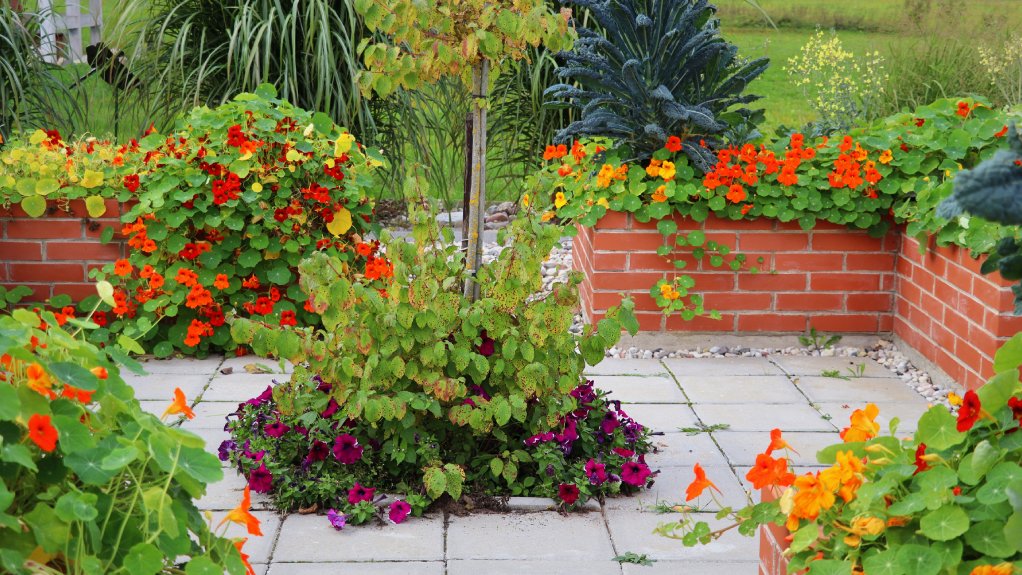Prettiest Edible Plants To Add Flavor To Your Flower Beds
Edible garden plants can have much more than standard vegetables. You can have a beautiful garden space using edible landscape plants that are pretty and practical.


Sign up for the Gardening Know How newsletter today and receive a free copy of our e-book "How to Grow Delicious Tomatoes".
You are now subscribed
Your newsletter sign-up was successful
You don’t have to be a chef to use pretty edible plants to beautify your meal. Decorative edible plants include flowers, herbs, and others and lend a natural and lively touch to food. Selecting the right plants for edible landscaping will not only add color and texture to the garden but can be used indoors to flavor and enhance your recipes.
Choosing Edible Landscape Plants
Opting for plants that are not only attractive but edible is a win-win. Varieties of common edibles like fruit trees, berry bushes, and grape vines add a wild aesthetic while providing food for the table. But even annuals can lend elegance and double as ingredients.
With varieties like “Bright Lights,” Swiss chard has a rainbow of colors reflected in its stems and steams up beautifully as a delicious side dish.
Dinosaur kale has deeply green foliage with a crinkled texture and is served up in salads, side dishes, soups, and stews.
Herbs have varied foliage and flowers that are eye-catching to pollinators. Fresh or dried, they are the melody to any dish.
Adding edible plants for landscaping doesn’t have to be chaotic but can be blended cohesively with other ornamental specimens with a little planning.
Elegant, Edible Plants for the Garden
Edible Flowers
One of the more common edible garden plants is the humble dandelion, although most of us don’t grow these flowers on purpose. Flowers, with their bright colors, myriad of forms, and ability to attract beneficial insects, may not strike you at first as food. But nasturtiums are easy to grow from seed, flame-colored, and add a peppery zing to salads. The flowers of many herbs are edible, such as bee balm, anise hyssop, and borage. Other bloomers to try:
Sign up for the Gardening Know How newsletter today and receive a free copy of our e-book "How to Grow Delicious Tomatoes".
- Redbud
- Lilac
- Rose
- Elderberry
- Orange blossoms
- Chive
- Sunflowers
- Mums
- Lilac
- Lavender
- Honeysuckle
- Pansy
- Hibiscus
- Daylily
- Viola
Edible Shrubs
Shrubs help fill in larger areas of the garden and add dimension and form. Some shrubs sport edible fruit, flowers, and foliage. They can be wildly wonderful as in the case of Harry Lauder’s Walking stick, a filbert with twisted stems.
Berry bushes are excellent ornamental plants that can provide their bounty for your table. Blueberries come in dwarf and standard size and ornament the garden with their glossy leaves, white flowers, and finally the cobalt fruit. The bush plum develops deeply purple little fruits while flowering quince produces classic canning fruit. An elderberry has lovely scalloped leaves and bright black-red berries perfect for jam or even wine.
Not every zone is suited for a pineapple guava shrub but the fruit really must be tried. Goji berries have become a very popular health food in recent years. Their slender leaves and stems are adorned with bright red berries.
Edible Climbing Plants
Low on garden space? Grow up. Vertical gardening is a fairly new trend that has caught on for condo owners and others with limited growing space. Vegetables may be trained to trellises, such as cucumbers, beans, peas, and tomatoes. Dwarf forms of grape offer their delicately notched leaves followed by fabulous clusters of fruit. Here’s some more to try:
- Butterfly pea
- Dragonfruit
- Passionfruit
- Hops
- Cider apple
- Jujube
- Malabar spinach
- Kiwi
- Chocolate vine
- Hyacinth bean
- Hops
Edible Native Plants
When selecting edible plants for landscaping, don’t forget the natives. Native plants are naturally adapted to the climate, soil, and local pests and diseases. They are often hardier than ornamental or imported varieties. Cascade Oregon grape is common in many areas of North America, producing deeply blue-purple berries. Sumac berries taste like lemonade, while cranberry Viburnum has delightfully tart fruits.
- American beech
- Black walnut
- Groundnut
- Chinquapin
- Basswood
- Back chokeberry
- Coastal strawberry
- Black chokeberry
- Nodding onion
- Chicory
Other Edible Ornamental Plants
A little sunshine, some good soil, water, and a seed packet can lead to a truly delicious and beautiful edible garden. Vegetables aren’t often thought of as pretty plants, but consider the bright fruits and gourds that dangle from their stems. A host of leafy greens offer dappled leaves, bright stems, and textured foliage.
Edible sweet potato leaves are attractive and heart shaped. Peppers of all types come in hues of red, purple, gold, orange, green, and almost black. Even common red tomatoes are available in hybrids of similar hues. Carrots with their feathery fronds, squash with their tumbling vines, and towering ornamental corn will add a festive touch to your garden during the growing season. An edible, ornamental garden can be that simple.

Bonnie Grant is a professional landscaper with a Certification in Urban Gardening. She has been gardening and writing for 15 years. A former professional chef, she has a passion for edible landscaping.